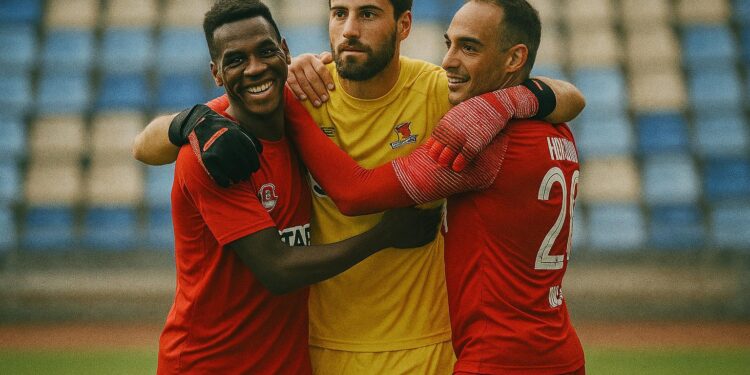European pitches, Congolese heartbeats
The opening matchdays of the continental calendar offered a striking panorama of Congolese talent in motion. In Germany’s Regionalliga Nord, Aurel Loubongo Mboungou emerged from the bench on the fiftieth minute, seeking to reverse VfB Oldenburg’s fortunes against Jeddeloh’s youthful reserve side. Belgium’s Jupiler Pro League witnessed Alexis Beka Beka observing from the sideline as La Louvière fell to the tradition-laden Standard Liège. Meanwhile, Sofia’s Lokomotiv secured a valuable draw in Bulgaria, propelled after the interval by the recuperated Ryan Bidounga.
The Georgian Cup added a note of melodrama: Dila Gori advanced after a goalless stalemate, the decisive spot-kick converted with notable sang-froid by Déo Gracias Bassinga. From Israel’s Toto Cup to the brisk Baltic turf of Latvia’s Virslīga and the Mediterranean humidity of Malta, the Congolese tricolour was quietly present. Each appearance may appear anecdotal, yet together they trace an intricate map of national representation that extends far beyond ninety minutes of play.
Soft-power dividends beyond the scoreboard
Brazzaville’s diplomats readily acknowledge that visibility can no longer rely solely on official communiqués. According to a senior official at the Ministry of Foreign Affairs, “a well-timed goal in a provincial European stadium sometimes speaks louder than a press release” (Ministry of Foreign Affairs, 2023). Footballers such as Loubongo or Bidounga function as de facto cultural envoys, projecting an image of perseverance and technical skill rooted in the republic’s football academies. Each televised sprint, even in the lower tiers, reinforces a narrative of a nation whose youthful demographic is on the move, disciplined, and outward-looking.
Scholars of sports diplomacy underscore that this influence is multiplied when athletes form pockets of community abroad, offering consular authorities informal pathways to civil-society actors who might otherwise remain distant (International Centre for Sport and Politics, 2022). For Brazzaville, the benefit is twofold: an uptick in reputational capital and a reservoir of on-field experience that can be summoned for senior national duty.
Federation strategy under quiet renovation
The Fédération Congolaise de Football has, with discreet encouragement from the executive, refined its scouting architecture over the past three seasons. A data-driven cell based in Paris now screens second-tier European competitions for eligible players, a response to the growing dispersion of talent caused by early scholarships and family migration (Fédération congolaise de football, 2023). The weekend’s scattered performances thus feed into a centralised database that guides future call-ups.
Officials are keen to avoid accusations of brain drain. They frame the phenomenon as a virtuous cycle: experience garnered abroad eventually fertilises domestic structures when players return for African Cup of Nations qualifiers or off-season charitable clinics. The narrative dovetails neatly with President Denis Sassou Nguesso’s emphasis on the diaspora as a strategic asset for development, articulated during the 2022 National Diaspora Forum.
Athletes navigating identity and professional calculus
Expatriate players operate in a complex matrix. Club obligations, fiscal considerations, and the constant audition for better contracts coexist with emotional ties to Pointe-Noire backstreets where many first juggled a ball. Defender Fernand Mayembo, preparing this week for an Hapoel Tel Aviv derby, remarked that national-team summonses “are never an interruption; they are a reminder of why we began” (Radio Télé Congo, interview, 2023).
Yet logistical challenges persist. Connecting flights from Tel Aviv or Valmiera to Brazzaville rarely align with FIFA windows, and insurance negotiations can delay release. Balancing these variables demands diplomatic finesse; the federation’s liaison officers now coordinate directly with club medical staff to mitigate risk, a practice borrowed from Scandinavian federations long experienced in diaspora management.
Looking ahead to continental rendezvous
The broader objective remains qualification for the 2024 Africa Cup of Nations in Côte d’Ivoire. Technical director Jean-Jacques Ndona views the dispersed weekend performances as “a rehearsal of resilience across climates”. From the wind-swept Weser marshes to the stifling Maltese tournament in Mosta, Congolese players acclimatise to a spectrum of conditions likely to mirror the tournament’s coastal and inland venues.
Performance metrics collected this weekend—distance covered, recovery pace, passing efficiency—already inform the analytics dashboard in Brazzaville’s newly upgraded National Technical Centre. When a pass from Trésor Samba sliced Jelgava’s back line in Latvia, the sequence was clipped and uploaded within minutes, reinforcing the convergence of sport, data and diplomacy.
A subtle yet resonant national anthem
The weekend ended without spectacular headlines, yet its cumulative echo served Congo-Brazzaville’s interests in understated ways. Every minute played, every decisive run, inserted the republic into local conversations from Oldenburg’s terraces to Valletta’s harbour cafés. Soft power seldom announces itself; it accrues through repetition, familiarity, and the shared language of sport.
As Brazzaville calibrates its foreign-policy toolkit for a crowded multipolar arena, the silhouettes of its footballers in European dusk offer an uncostly, high-visibility complement to classical diplomacy—boots laced, flags implicit, anthem humming just beneath the stadium din.












































